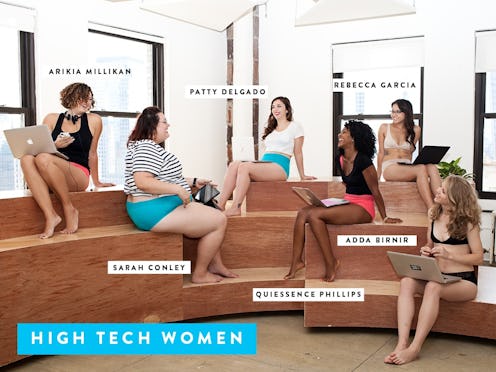
There's nothing like a group of women in their underwear to ruffle a few peoples' feathers, right? Julie Sygiel, founder of tech apparel brand Dear Kate, now knows the answer to that question better than just about anyone. Following the release of the brand's newest collection of bras and underwear (called the 'Ada Collection') and the corresponding Dear Kate lookbook, which featured real women in real tech jobs modeling the underthings, a media storm has ensued that only the deadly combination of highly opinionated people and the Internet can create.
In case you haven't already seen news of the "controversial" campaign floating around the Internet (you probably have), here's the run-down: The Ada collection is named after Ada Lovelace, the world's first female computer female programmer. Sygiel chose to feature real women in real tech jobs to model the high-tech bras and underwear rather than hiring your average model. The women range from CEOs to programmers, and are all beautiful while still looking a whole lot like you or I do in underwear. What's not to love about that?
I covered the collection and the release of the lookbook before it was being discussed as something controversial. When I initially saw the lookbook, I was thrilled that a company would choose to highlight its products in a way that creatively and tastefully showcased women as multi-dimensional, successful professionals who, oh yeah, just happen to wear underwear too. To me, nothing was controversial about it other than that it wasn't the models that people were used to seeing — and that was, and still is, a very good thing in my book.
You can imagine my surprise when even I, who had virtually no personal connection to the collection/lookbook other than being lucky enough to write about it, received nasty tweets describing the campaign as "disgusting." I was dumbfounded.
And then the articles started to come in, one after the other, all describing the lookbook with one big, fat word in every headline: controversial. Along with an outpour of positive response and support, the reason the "controversy" continues to brew is those who responded to the campaign claiming it was something that demeaned successful women, rather than celebrated them.
As Elissa Shevinsky, CEO of Glimpse labs said in an interview with Time regarding the campaign, “Posing in your underwear undermines the message that you aim to be taken seriously as a technologist."
Even though Shevinsky's point is understandable to a certain extent, it's almost as if people are reading the headlines and not even glancing at the photos themselves. The lookbook itself is incredibly well done and tastefully designed. The photos are of women sitting at their laptops, wearing their underwear. No one is bending over, caked in make up or wearing stilettos. It is simply real women, in real situations, wearing more clothing than most bathing suits.
And as Julie Sygiel told me in an e-mail, the negative reactions imply issues much greater than simply the controversy surrounding the campaign itself.
"The negative reactions are implying that women in tech are held to different standards and are confined to specific behavior," Sygiel said. "Now more than ever it's time to talk about not judging women based on our appearance — if someone thinks our models aren't as competent because they posed in underwear, I think that's incredibly superficial."
A freakin' men.
How long have we been trying to fight the "a girl cannot be smart, pretty, and funny all at once" notion? We, as women, are indeed multi-dimensional. The negative reactions imply that we should be ticking certain boxes, and realizing that we will never be allowed to tick others. Want to be a CEO? Sure, but just know that you'll always have to be just a little less feminine and a little more serious. The idea that women in tech take themselves or their careers any less seriously because they posed in a tasteful underwear ad (that highlighted their success and beauty, rather than claiming that a women can only choose one) is archaic, and so are the negative responses to the campaign, however well-intentioned they may be.
Rebecca Garcia, founder of Geek Girl Web and model for the Ada collection lookbook, said in an email to Bustle that she did the campaign to dispel the very notion that Sygiel touched on.
"It's such a double-edged sword; this past year ... model Lydnsey Scott (who has modeled for Victoria's Secret, Gucci) has been praised for coding in her spare time..." Garcia said. "Young girls are more likely to say 'model' as a dream career than 'engineer' or 'developer.' I did the campaign hoping to help to break the stereotypes that women can't be seen as beautiful and intelligent."
It would be one thing if the campaign was sexualizing professional women. It would be one thing if the collection was aimed directly at men. It would be one thing if the models themselves didn't make conscious, intelligent, individual choices to be involved in the campaign. But none of those things are reality. When you step away from the click-baited headlines, and take the campaign for what it truly is, then it doesn't seem very controversial at all. In fact, it starts to seem kind of wonderful.
And as young woman, who has every hope to reach the level of success as all of the lookbook's models, it makes me feel proud. Because when I look at the models, the product, and the campaign as a whole, what I see is women who look like me, who are successful—who are leading careers that I would hope to have. I see women who are proud, confident, and secure in their natural beauty and real bodies. I see women that I could probably learn a whole lot from. Oh — and a product I would want to wear and buy. And that's kind of the whole point, isn't it?
Images: Brister Photo (4)